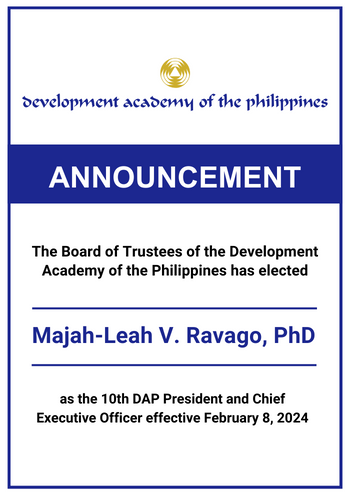The Development Academy of the Philippines, through its Modernizing Government Regulations (MGR) Program, conducted the eighth and ninth runs of the basic course on regulatory impact analysis (RIA) for various regulatory agencies at the Crowne Plaza Manila Galleria at the Ortigas Center in Quezon City.
The course, which aimed to enable the participants to conduct RIA towards improving the quality and coherence of regulations, taught the participants the importance of RIA in developing new regulations and evaluating the present regulations while determining the roles and responsibilities of regulators and identifying the processes in the conduct of RIA.
The two batches that underwent the course were able to draft the RIA of existing and proposed regulations in their respective agencies and to draw up action plans to conduct a full-blown RIA.
Participating agencies
A total of 87 participants from 24 government agencies attended the two runs of the course. These agencies are the Bureau of Internal Revenue, City Government of Makati, City Government of Mandaluyong, Department of Agrarian Reform, Department of Environment and Natural Resources, Department of Health, Department of Labor and Employment, Department of Public Works and Highways, Department of Transportation, Department of the Interior and Local Government, Environmental Management Bureau, Fertilizer and Pesticide Authority, Food and Drug Administration, Land Registration Authority, Land Transportation Office, Local Water Utilities Administration, National Competitiveness Council, National Housing Authority, Philippine Coconut Authority, Philippine Fiber Industry Development Authority, Philippine Health Insurance Corporation, Philippine Institute of Traditional and Alternative Health Care, Philippine Nuclear Research Institute, and Securities and Exchange Commission.
Future plans
For 2018, the MGR Program eyes to continue its capability development activities on good regulatory practices. These include RIA, Public Consultation, Compliance Cost Analysis, and Regulatory Management System.
The program will also focus on providing customized technical assistance for government regulatory bodies to facilitate the adoption of the RIA. This is expected to improve the regulation-making process and facilitate the establishment of the regulatory management system or RMS to effectively manage the delivery of regulatory services. – Lea S. Peralta and Aaron B. Suaco




